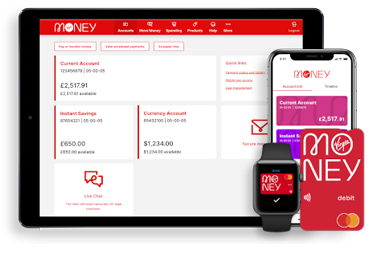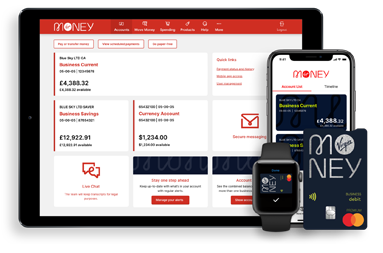-
Login
More Login links
Internet Banking
Business Internet Banking
Started an application?
Other services
Help
-
Register
More Register links
Internet Banking
Business Internet Banking
Other Services
- Our Products More business product links
Bank accounts
- Business current account
- Business choice account
- Switching business accounts
- Compare all business accounts
Savings accounts
Loans and Finance
- All Treasury solutions
Treasury solutions
Help and support
- Online Banking More online banking links
BusinessOnline
- Commercial More commercial business links
Business enquiries
Contact us about a general enquiry.
- Corporate and Structured Finance More corporate business links
Corporate and Structured Finance
SME Cashflow Finance
Unlock your cash flow potential. At Yorkshire Bank we take a flexible approach to business borrowing.
Lending is subject to status and eligibility.
- Our Sector Expertise More sector expertise links
Using online channels to sell your business
< back to all business news articles
18/10/2017
Selling your business can be tricky. There'll be a period of time when you want to screen interested buyers, but you're not ready for everyone else - employees, suppliers, customers - to know about your plans. And you definitely don't want to let competitors know your sale plans - unless you're considering a specific competitor as a likely buyer.

The internet can be an effective method of reaching potential buyers outside your network. Online marketplaces are the go-to resource for buyers and sellers, so it’s worth making sure you consider an online strategy when selling.
It’s especially important if you have a specialised business, operate in a small niche or have a business that doesn’t have a ready market of buyers.
Quiet marketing
One option is to start ‘putting the word out’ through third parties such as your accountant, lawyer or business association network. Small teaser adverts promoting the opportunity but not the details. Have these third parties screen applicants to ensure they are legitimate and not competitors spying.
Make use of business brokers
Brokers will have their own websites with sales listings, done in such a way as to conceal the identity of the businesses yet still offering information that potential buyers will find interesting and relevant.
Business brokers will also have access to information regarding potential buyers. They could be their own clients, or people they know through their networking contacts. They're able to connect the sellers and buyers in this way, without breaching confidentiality.
Find brokers that focus on your industry, or have a nation wide (or even international) footprint.
Online marketplaces
If you're not using a business broker, you can still list your business online yourself. UK Businesses For Sale is a great example of a place to start. Not only can you list your business, but they offer free selling guides to help make the process easier.
You can also make use of online forums. You'll network with other business owners who are also selling their business, and these contacts can be useful. UK Business Forums is a good example of a connected group of business owners.
Marketing your business online
Once you've decided which online marketplaces to use, it's time to craft the advertisement. Keep the following in mind:
- Make sure you give yourself enough time. It's important to not only be sure of your decision to sell, but to have all information relating to potential growth and revenue, past performance and business costs on hand. Putting the time and effort into preparing these figures in advance will tell potential buyers that you know what you're doing and give them more confidence in you.
- Determine a fair asking price. We've got a guide on how to accurately value your business before selling. Read through it and work out a market price range for your business. Online marketplaces often provide tools for determining a fair asking price, and they're worth making the most of. Always seek professional help when determining a price for your business.
- Provide as much information as possible without giving away the identity of your business. You'll need to say where the business is located, but don't give out the actual address.
- Create contact details that aren't related to the business. Don't use your business email address as the contact - set up a different one through Gmail or another free email provider. Likewise, use a different phone number, not your business one.
- Provide reasons why you're selling the business. Potential buyers are less sceptical if they know what's behind your decision to sell.
Once you list your business, you might find that certain questions come up repeatedly. This can serve as a guide for what you should add to your listing if on-going editing is possible.
Maintain communication
Once you've listed your business, make sure you check your email address and respond to any inquiries in a timely fashion. Arrange to talk to interested parties via telephone as soon as possible. There's nothing more frustrating for potential buyers than sellers who are difficult to communicate with.
Non-disclosure agreements (NDA’s)
It’s worth including an NDA online with the listing. What you're saying to interested parties is that this is the agreement they'll have to sign before you'll provide any further information. It's a good way to weed out the tyre-kickers.
Summary
Although it's still worth listing your business in traditional ways - business journals, industry newspapers, at networking events etc - getting the word out there online can be an effective method to widen the pool of potential buyers. Whether you go with a business broker or decide to list it yourself, make sure you get advice from your professional advisors.
Additional resources
POSTED IN: 2017,Succession,Growth
SHARE
Related Articles
You are here: Business Banking > Business News > Articles
- About Yorkshire Bank
- About us
- Virgin Money UK PLC
- Media relations
- Careers

Internet Banking has moved
To log into Internet Banking you now need to use Virgin Money Internet Banking. You'll get the same great service and are able to access all your accounts.
Your log in details will stay the same and you can log in directly from the shiny new Virgin Money website.
Continue to Virgin Money Internet Banking
Go to the Virgin Money website
Be Alert
Never tell anyone a token 3 response code, even someone from the bank. You should only input these codes to our secure Business Internet Banking service when you’re sending and making payments. If anyone calls and asks for a token 3 response code or asks you to authorise a payment on the App for fraud checks, hang up and call us on 0800 085 2914 from another line if possible, remember the Bank will never ask you to disclose your security details.
Continue to Virgin Money Business Internet BankingYou can find impartial information and guidance on money matters on the “MoneyHelper” website.
Yorkshire Bank is covered by the Financial Services Compensation Scheme (FSCS), Find out more.
